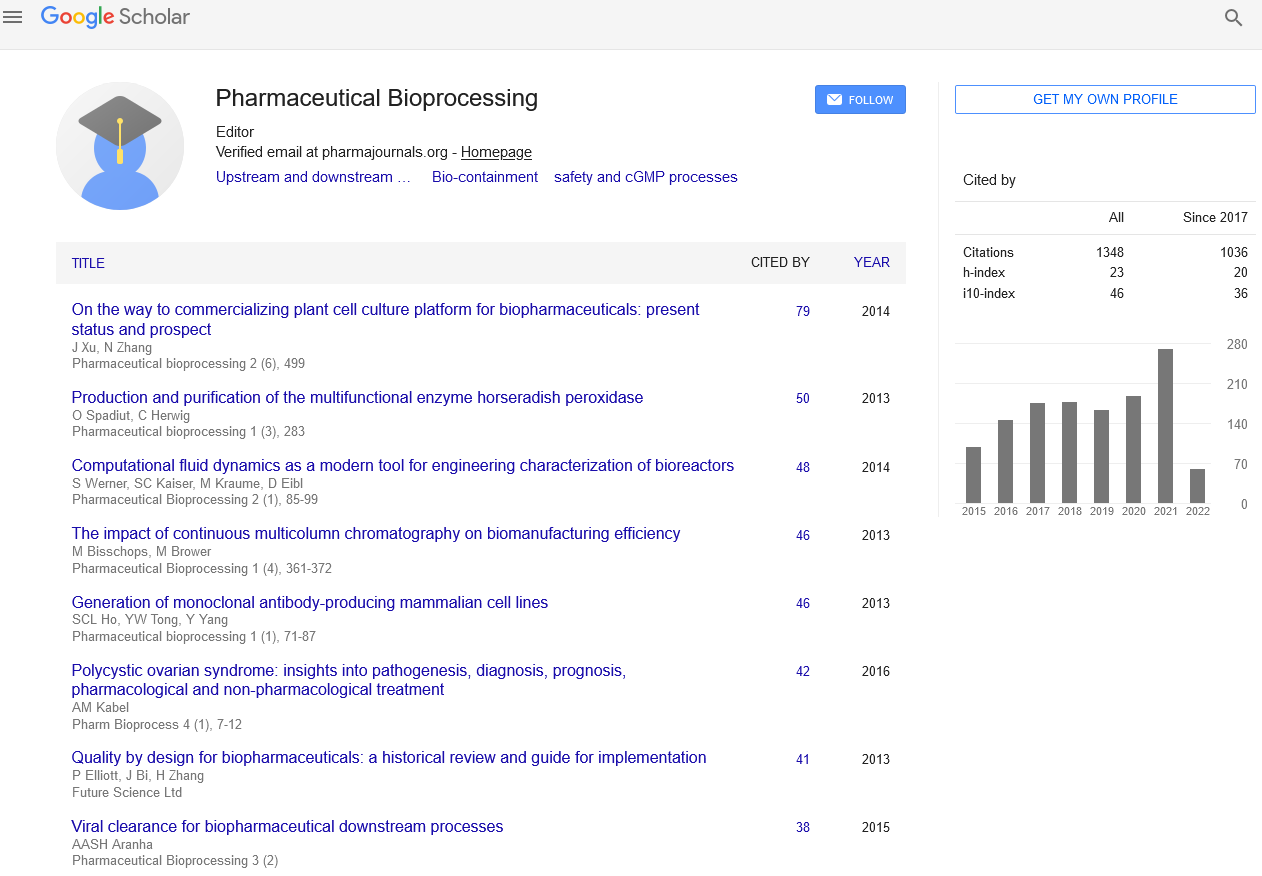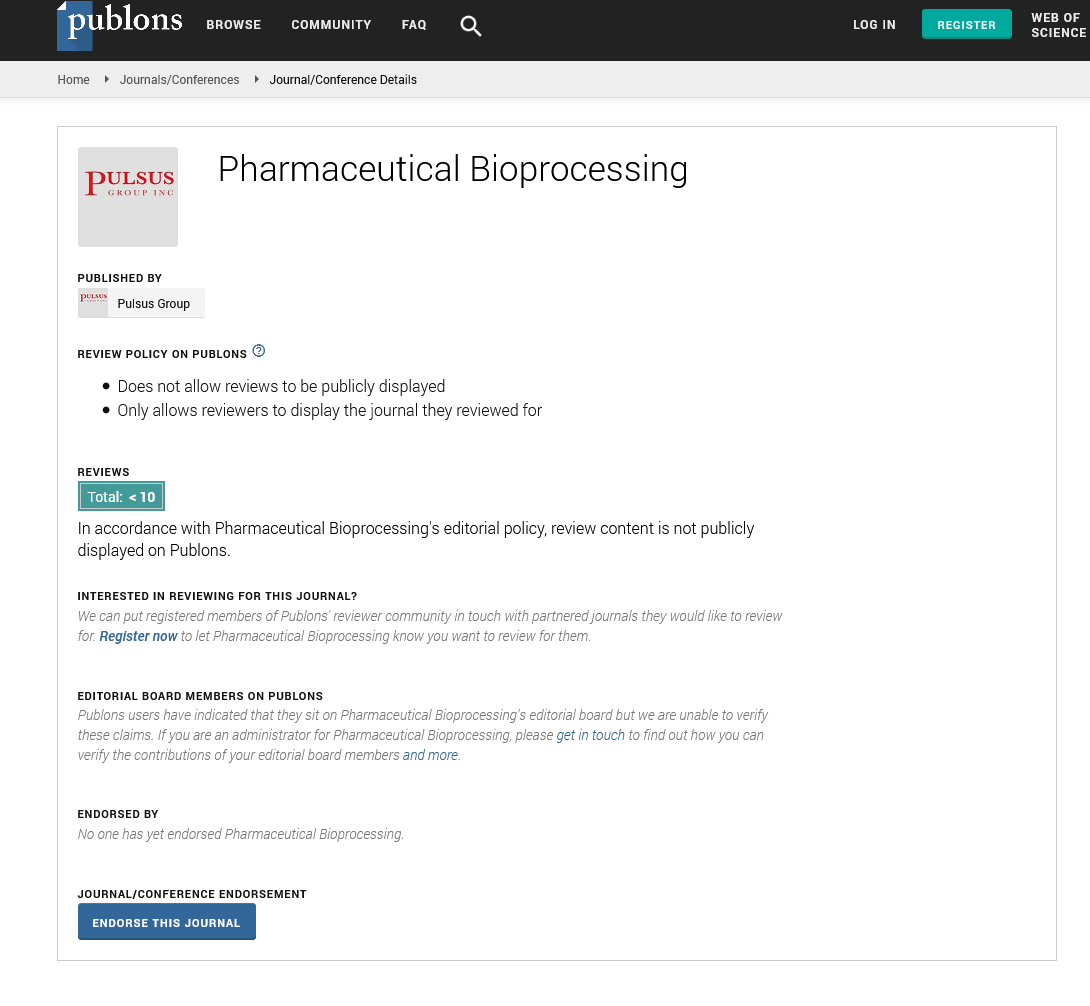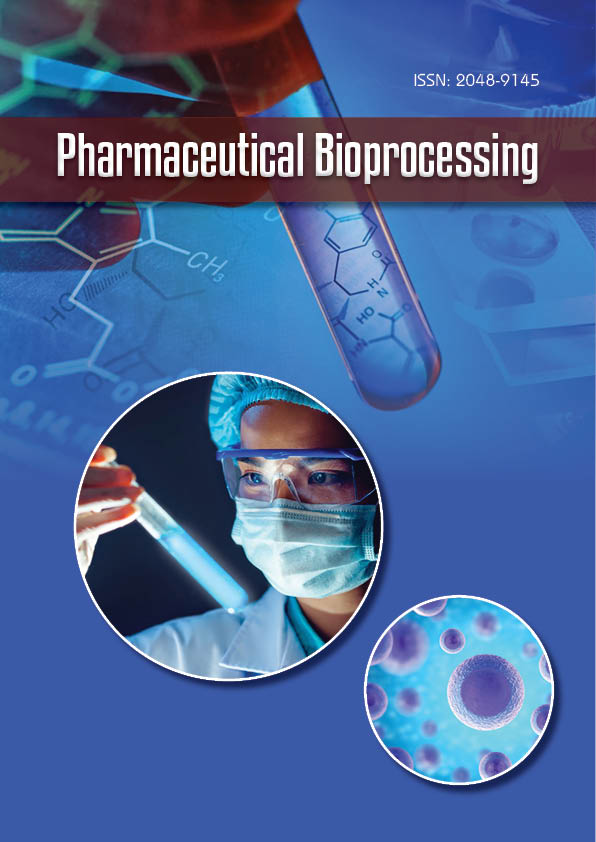Perspective - Pharmaceutical Bioprocessing (2024) Volume 12, Issue 5
Regulatory Issues and Debates in Modern Biomanufacturing
- Corresponding Author:
- Yasuko Rikihisa
Department of Regulatory Affairs,
University of Navarra,
Pamplona,
Spain
E-mail: rikihisa.10@osu.edu
Received: 06-Sep-2024, Manuscript No. fmpb-24-147513; Editor assigned: 11-Sep-2024, PreQC No. fmpb-24-147513 (PQ); Reviewed: 24-Sep-2024, QC No. fmpb-24- 147513; Revised: 01-Oct-2024, Manuscript No. fmpb-24-147513 (R); Published: 28-Oct-2024, DOI: 10.37532/2048-9145.2024.12(5).218-219
Introduction
The biomanufacturing industry stands at the forefront of scientific and technological advancement, playing a crucial role in developing life-saving therapies and innovative products. However, this rapidly evolving field faces a host of regulatory challenges and debates that impact every aspect of biomanufacturing, from product development to market approval. Navigating these complexities is essential for ensuring the safety, efficacy and accessibility of biopharmaceutical products. This article explores the key regulatory issues and areas of debate in modern biomanufacturing, highlighting the ongoing struggles and potential solutions.
Description
Regulatory frameworks and challenges
Evolving standards and guidelines: One of the most significant regulatory challenges in biomanufacturing is the rapid pace of scientific and technological advancement. Regulatory agencies, such as the U.S. Food and Drug Administration (FDA) and the European Medicines Agency (EMA), must continuously update their guidelines to keep pace with new technologies and methodologies. This often results in a lag between the development of new technologies and the creation of comprehensive regulatory standards.
For instance, the advent of gene therapy and advanced cell therapies has led to regulatory uncertainties. While these therapies offer groundbreaking potential, they also present unique challenges in terms of safety, efficacy and long-term effects. Regulatory bodies are tasked with developing frameworks that address these issues while still fostering innovation.
Data integrity and compliance: Data integrity is a critical aspect of regulatory compliance in biomanufacturing. Regulatory agencies require accurate, reliable data to assess the safety and efficacy of biopharmaceutical products. However, the complexity of biomanufacturing processes, coupled with the increasing use of advanced technologies such as Artificial Intelligence (AI) and Machine Learning (ML), raises concerns about data management and integrity.
Ensuring compliance with Good Manufacturing Practice (GMP) standards is vital, but the integration of new technologies can sometimes create gaps in data handling and documentation. Addressing these gaps requires continuous training, robust systems for data management and stringent validation processes to maintain high standards of data integrity.
Global harmonization: Biomanufacturers often operate in multiple regions, each with its own regulatory requirements. This lack of global harmonization can create significant challenges, including increased costs and delays in bringing products to market. While efforts to harmonize regulatory standards through international organizations like the International Council for Harmonisation (ICH) have made progress, disparities remain.
Areas of debate
Ethical considerations in emerging technologies: Emerging technologies such as gene editing, synthetic biology and personalized medicine raise complex ethical questions. For instance, the use of CRISPR technology for gene editing has opened new possibilities for treating genetic disorders but also raises concerns about potential unintended consequences and ethical implications of modifying the human genome.
Regulatory agencies and stakeholders must grapple with these ethical considerations while developing frameworks that ensure responsible use of these technologies. Public input and transparent discussions are essential for addressing ethical dilemmas and ensuring that technological advancements align with societal values and expectations.
Manufacturing and supply chain transparency: The COVID-19 pandemic highlighted the importance of transparency in the biomanufacturing supply chain. Issues such as raw material shortages, production delays and supply chain disruptions underscored the need for greater visibility and resilience in manufacturing processes.
Regulatory bodies and industry stakeholders are now debating how to enhance supply chain transparency and ensure the reliability of biopharmaceutical production. Implementing measures to track and manage the supply chain effectively is crucial for maintaining product quality and availability, particularly in times of crisis.
Potential solutions and future directions
Enhanced collaboration and dialogue: To address regulatory challenges and debates, enhanced collaboration between regulatory agencies, industry stakeholders and academia is essential. Engaging in open dialogue can help identify common goals, share best practices and develop harmonized standards that promote innovation while ensuring safety and efficacy.
Initiatives such as public-private partnerships and industry consortia can facilitate collaborative efforts to tackle complex issues and advance regulatory science. By working together, stakeholders can address emerging challenges and drive progress in biomanufacturing.
Adaptive and risk-based approaches: Adopting adaptive and risk-based regulatory approaches can help address the dynamic nature of biomanufacturing. For example, regulatory frameworks that allow for iterative assessments and real-time monitoring can accommodate the rapid pace of technological change and emerging risks.
Risk-based approaches focus on evaluating and mitigating potential risks rather than adhering to rigid standards. This flexibility can enable regulatory agencies to respond more effectively to new developments and ensure that regulatory requirements are proportionate to the risks involved.
Conclusion
Regulatory issues and debates in biomanufacturing are complex and multifaceted, reflecting the dynamic nature of the industry and the rapid pace of technological advancement. Addressing these challenges requires a collaborative and adaptive approach, focusing on harmonization, transparency and ethical considerations. As the industry continues to evolve, ongoing dialogue, innovation and investment in education will be crucial for navigating regulatory landscapes and ensuring the successful development and delivery of biopharmaceutical products.


